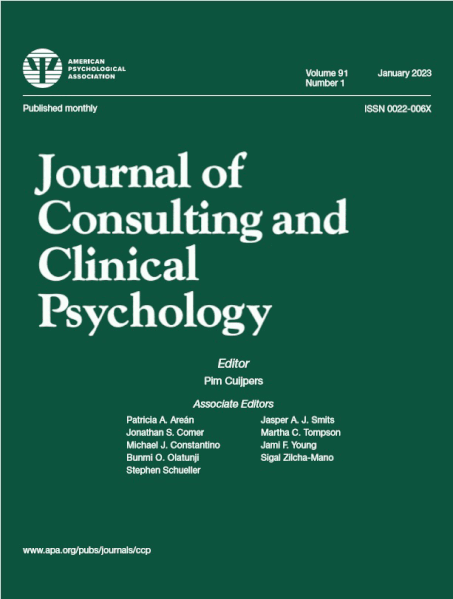减少外观问题的安全行为:基于智能手机的干预随机对照试验。
IF 5
1区 心理学
Q1 PSYCHOLOGY, CLINICAL
引用次数: 0
摘要
目的:外貌问题是多种精神障碍(如身体畸形障碍、饮食障碍和社交焦虑障碍)的核心特征。有这些顾虑的人通常会做出与外貌相关的安全行为(ARSB),这些行为旨在避免、预防或管理对自己外貌的负面评价。本研究评估了一种针对外貌问题的简短ARSB减少干预措施。方法从美国各地招募了外貌问题严重的女性(N = 203),并随机分配她们接受两种为期1个月的智能手机干预措施,其中一种针对ARSB或不健康行为(UHB)。这两种干预都包括每日短信,短信中包含行为清单链接和避免相应行为的提醒。虽然 UHB 消退的治疗依从性明显优于 ARSB 消退,但 ARSB 消退使患者在治疗后对外表的担忧(sr² = .028,p = .014)和饮食失调症状(sr² = .024,p = .与 UHB 消退相比,ARSB 消退会在治疗后明显降低外貌问题(sr² = .028,p = .014)和饮食失调症状(sr² = .024,p = .020),并在 1 个月的随访中降低外貌问题(sr² = .041,p = .004)、饮食失调症状(sr² = .029,p = .006)、社交焦虑(sr² = .048,p = .005)和外貌重要性(sr² = .042,p = .011)。这些初步研究结果为针对 ARSBs 的疗效提供了新的证据,并表明这种基于文本的干预措施可能是一种有效且易于接受的干预措施,适用于对外貌高度关注的女性。(PsycInfo Database Record (c) 2024 APA,保留所有权利)。本文章由计算机程序翻译,如有差异,请以英文原文为准。
Safety behavior reduction for appearance concerns: A randomized controlled trial of a smartphone-based intervention.
OBJECTIVE
Appearance concerns are a core feature of multiple psychiatric disorders (i.e., body dysmorphic disorder, eating disorders, and social anxiety disorders). Individuals with these concerns commonly engage in appearance-related safety behaviors (ARSB), behaviors intended to avoid, prevent, or manage the negative evaluation of one's physical appearance. The present study evaluated a brief ARSB reduction intervention for appearance concerns.
METHOD
Women with elevated appearance concerns (N = 203) were recruited from across the United States and randomized to receive one of two 1-month smartphone-based interventions targeting ARSBs or unhealthy behaviors (UHBs). Both consisted of daily text messages with links to behavior checklists and reminders to avoid the respective behaviors.
RESULTS
Participants in both treatments saw substantial reductions in symptoms. Though the UHB fading condition showed significantly better treatment adherence than ARSB fading, ARSB fading led to significantly lower appearance concerns (sr² = .028, p = .014) and eating disorder symptoms (sr² = .024, p = .020) at posttreatment, and lower appearance concerns (sr² = .041, p = .004), eating disorder symptoms (sr² = .029, p = .006), social anxiety (sr² = .048, p = .005), and appearance importance at 1-month follow-up (sr² = .042, p = .011), relative to UHB fading. Changes in ARSBs were found to partially mediate the effect of treatment on appearance concerns.
CONCLUSIONS
These preliminary findings provide novel evidence for the efficacy of targeting ARSBs and suggest that this text-based intervention may be an efficacious and accessible intervention for women with elevated appearance concerns. (PsycInfo Database Record (c) 2024 APA, all rights reserved).
求助全文
通过发布文献求助,成功后即可免费获取论文全文。
去求助
来源期刊

Journal of consulting and clinical psychology
PSYCHOLOGY, CLINICAL-
CiteScore
9.00
自引率
3.40%
发文量
94
期刊介绍:
The Journal of Consulting and Clinical Psychology® (JCCP) publishes original contributions on the following topics: the development, validity, and use of techniques of diagnosis and treatment of disordered behaviorstudies of a variety of populations that have clinical interest, including but not limited to medical patients, ethnic minorities, persons with serious mental illness, and community samplesstudies that have a cross-cultural or demographic focus and are of interest for treating behavior disordersstudies of personality and of its assessment and development where these have a clear bearing on problems of clinical dysfunction and treatmentstudies of gender, ethnicity, or sexual orientation that have a clear bearing on diagnosis, assessment, and treatmentstudies of psychosocial aspects of health behaviors. Studies that focus on populations that fall anywhere within the lifespan are considered. JCCP welcomes submissions on treatment and prevention in all areas of clinical and clinical–health psychology and especially on topics that appeal to a broad clinical–scientist and practitioner audience. JCCP encourages the submission of theory–based interventions, studies that investigate mechanisms of change, and studies of the effectiveness of treatments in real-world settings. JCCP recommends that authors of clinical trials pre-register their studies with an appropriate clinical trial registry (e.g., ClinicalTrials.gov, ClinicalTrialsRegister.eu) though both registered and unregistered trials will continue to be considered at this time.
 求助内容:
求助内容: 应助结果提醒方式:
应助结果提醒方式:


